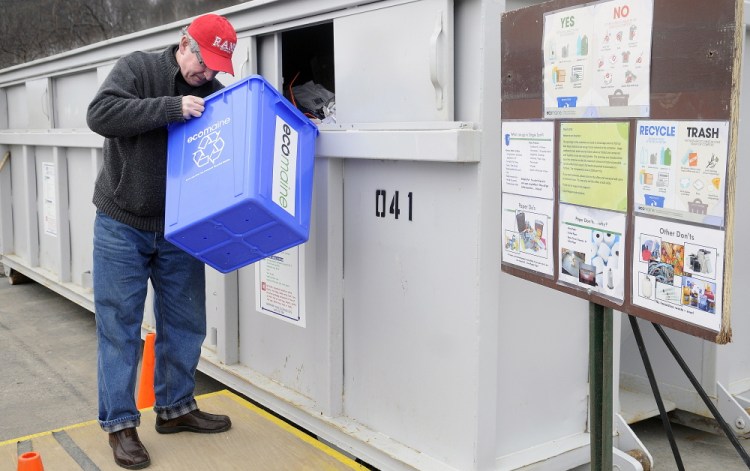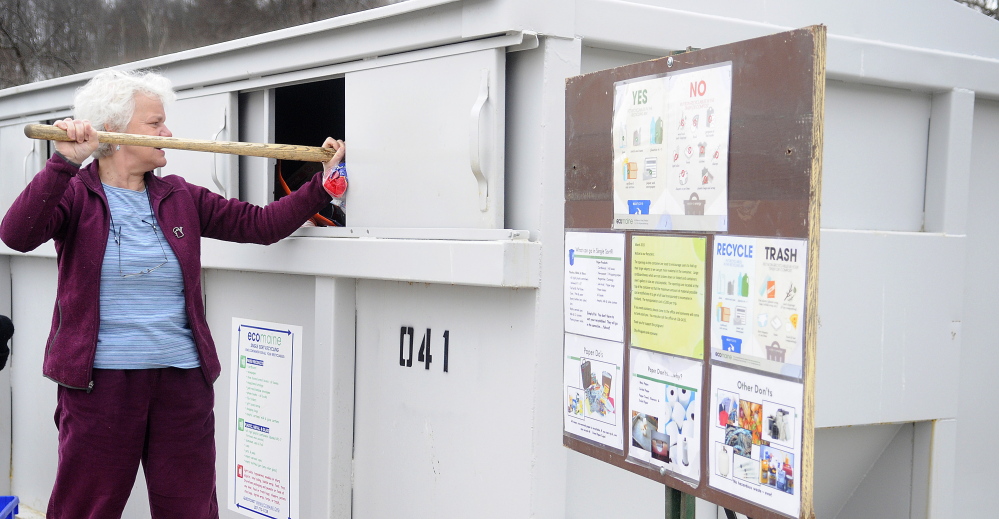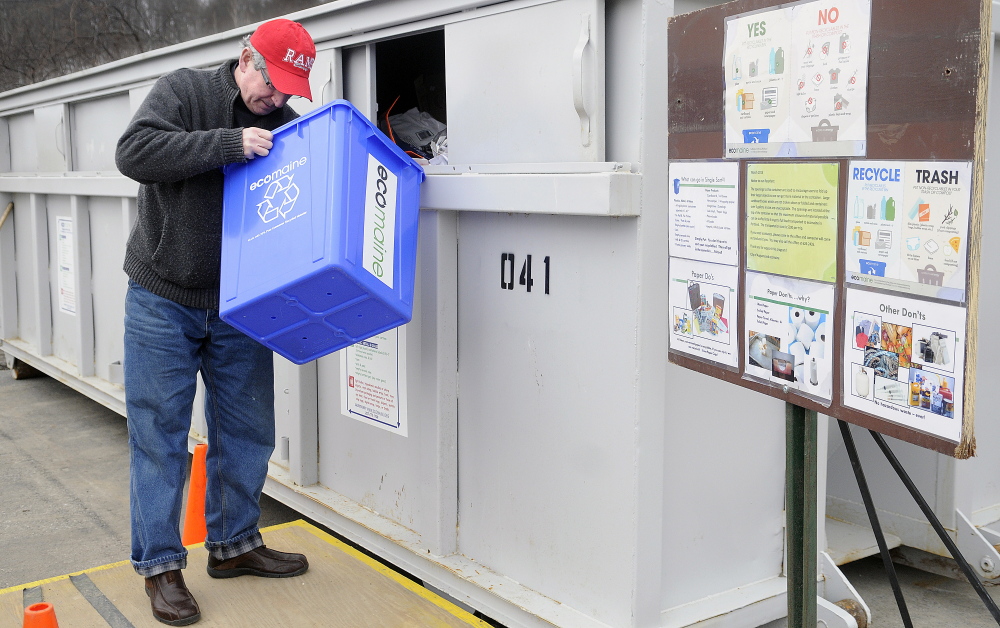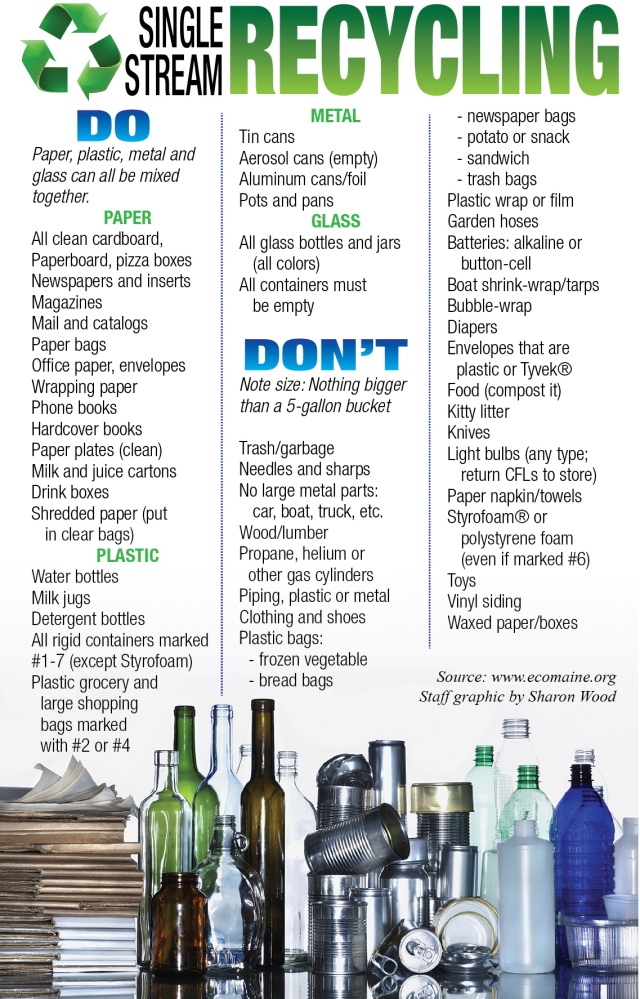AUGUSTA — The city’s new single-sort, drop-off recycling program is exceeding expectations in its first month, though officials speculate the program is not yet prompting residents who weren’t recycling already to start.
Four large steel roll-off containers, each full of about two tons of residents’ unsorted recyclables, have been trucked to an ecomaine processing center in Portland as part of the new single-sort drop-off recycling program. The city is trying it for six months to see how it goes.
That eight tons of collected material somewhat exceeds officials’ expectations, and it gives proponents hope the city will expand the program beyond six months, potentially to collecting unsorted recyclables curbside on a regular basis.
“People have been very pleased with it. It has been busy,” said Lesley Jones, the city’s public works director. “I figured we’d send one container a week, and about a ton a week. But we’ve been able to use equipment to compact it, so we’re getting 2 tons in each container, which helps with transportation costs. So we’re doing one container a week, at two tons a week.”
Ultimately, city officials and others hope more recycling in Augusta and elsewhere will mean a longer lifespan for the Hatch Hill Solid Waste Disposal Facility, which, at the current rate, is projected to last an estimated 15 years before action needs to be taken.
“It’s not only important for the city of Augusta to extend the life of the current landfill, but to remember managing a raw waste landfill is a forever proposition,” said Lissa Bittermann, business development manager for Ecomaine. “There is a cost to put that material in the ground and the cost to monitor that facility, basically, forever. You never like to lose sight of the environmental impact of putting plastic and metal in the ground. It’s important for people to think of this not just from a financial standpoint, but from the standpoint of being a good citizen of the planet.”
SO FAR, SO GOOD
The city’s only cost in the new single-sort program is the cost of transporting the full containers to ecomaine, so the more the city can stuff into each container, the better. Transportation costs are roughly the same, regardless of how much material is inside the steel containers provided by Ecomaine.
At-large City Councilor Dale McCormick, who pushed for the city to expand its recycling program, said the results so far are encouraging. She’s hopeful it will lead to a curbside recycling program to increase residents’ participation further.
“I think it has been a success,” she said, while acknowledging it isn’t entirely clear-cut how the city will judge whether the pilot program is successful. “It’s got a nice buzz and people are paying attention. Normally the way of evaluating something is you look at the before and after. But we have a before which is nothing like what we’re doing now. One could say we’re 8 tons to the good.”
Bittermann, who works for ecomaine, a nonprofit recycling and waste-to-energy firm owned by several southern Maine municipalities, said the firm is pleased with the amount of materials coming from Augusta so far, but she thinks most participants were already recycling anyway.
She should know. She’s spent eight days in Augusta, talking with residents and explaining the process and benefits of single-sort recycling over the last month as part of education outreach efforts for the program’s roll-out.
“I feel like the people who were already recycling in Augusta have embraced the switch to single-sort,” Bittermann said. “Many of them have exclaimed to me, ‘Thank God you’re here; we’ve been waiting,’ and ‘It’s about time. Augusta has needed this for ages.’ So they’re really happy they can recycle more items, and it’s much more convenient now.”
But is it prompting people who now throw away their recyclable items with the rest of their household trash, which is dumped at Hatch Hill, to recycle those items instead?
“I don’t think so, not yet,” Bittermann said. “Thus far, we’re encountering mostly the die-hards. I’m very eager to get out into the broader community and do some outreach to connect with folks who maybe don’t even know the program has started, and explain how easy it is.”
Three of the four containers of recyclables that have been filled and taken to ecomaine were from the John Charest Public Works Facility on North Street, while just one container so far has been filled at Hatch Hill.
NEW LOCATION
Dropping off recycling at the public works location is free, while there is a charge to recycle at Hatch Hill. Users of the Hatch Hill site are charged $1 a bag of single-sort recyclables, or a minimum of $2.50 for up to about 200 pounds. Users taking their trash to Hatch Hill can get a discount on their garbage rate if they have recyclables to drop off, too.
Jones said there is a charge to recycle at Hatch Hill, but not the other locations in the city, because the dump is used by Augusta and seven surrounding municipalities, and it runs like a business. Taking the recyclables container to Ecomaine costs about $200 a trip, under a contract with Riverside Disposal of Chelsea, which hauls the containers. So, Jones said, Hatch Hill has to charge to recycle to cover that fee.
Augusta residents, meanwhile, may use the public works site, or another container that soon will be placed in the back parking lot at Augusta City Center, for free. The approximately $7,000 annual cost of taking those containers to Hatch Hill will be covered under the city’s rubbish budget.
Bittermann and Jones said the third container will be placed outside City Center in mid-April, after the snow in the parking lot melts.
The container at public works is available only during the landfill’s hours of 7 a.m. to 4 p.m., Monday through Friday. At other times, it’s behind a closed gate. Similarly, the container at Hatch Hill is accessible only when the landfill is open, from 8 a.m. to 4 p.m. Tuesday through Saturday. The City Center container, on the other hand, will be accessible 24 hours a day, seven days a week.
“City Center was chosen because not everybody can get (to public works or Hatch Hill) when we’re open, so it gives people an opportunity, on Sundays and late at night, to be able to use it,” Jones said. “Part of the reason it will be put there is to give people access 24/7. But then 24/7 access can lead to undesirable activities.”
To try to prevent that, a camera will be aimed at the container in the parking lot, and a sign will be placed to let users know they are being monitored.
Bittermann said there are concerns about people dumping garbage or other nonrecyclable items in that container but the camera should help. She said Ecomaine containers are in plenty of locations elsewhere where they are not monitored, and while those sites do tend to get more inappropriate items, sites monitored by cameras have had only a few instances of illegal dumping.
“My hope is the only things that end up in there, that don’t belong there, will be innocent mistakes,” Bittermann said. “Time will tell if people will self-monitor, and monitor their neighbors. People are excited about this, and I don’t think residents are going to take too kindly of others abusing the site.”
Jones and Bittermann said there have only been a few instances of residents placing nonrecyclable items in the containers. Jones said nonreusable plastic bags are a common item people try to put into the bins but shouldn’t.
MORE OPTIONS
The city still collects some recyclable items curbside as part of its previous rubbish and recyclables collection system, but the new single-sort, drop-off program takes many more types of materials than the older curbside program.
The city already accepted newspapers, magazines, steel cans, clear glass containers and No. 2 clear plastic such as milk jugs in its curbside pickup program. It doesn’t take noncorrugated cardboard such as cereal boxes, or white milk jugs or other types of plastic. That program will continue separately from the single-sort trial.
The single-sort program accepts a wider variety, including plastics Nos. 1 through 7, most types of paper, clear or colored glass, cans, aluminum, cardboard, cereal boxes, plastic grocery bags and wrapping paper. It does not accept Styrofoam or plastic trash bags.
McCormick said she’d like to see the city eventually convert to a full curbside program, but that costs money.
Jones noted the city would have to add expensive infrastructure or contract with an outside firm to create a full-fledged curbside recycling program. She said adding a compactor at Hatch Hill, which previously has been estimated to cost $400,000, would allow the city to compact recyclables there, though the facility lacks the three-phase power required to do so.
She said another option could be, as the city of Waterville recently began doing, contracting with an outside firm to collect recyclables curbside in Augusta and haul them to a processing facility. She said the “very preliminary” estimate of the cost of doing that in Augusta would be $120,000 to $150,000 a year. The city’s total budget for solid waste removal, including $17,000 for the ongoing single-sort recycling pilot program, is $850,000 in City Manager William Bridgeo’s proposed budget for the coming year.
McCormick said she’s heard there might be interest, in surrounding towns, in jointly creating a dual-sort recycling program and possibly creating a processing facility in central Maine. Dual-sort recycling systems, she said, would require users to sort all containers, including plastic, metal and glass, from the other, fibrous recyclable materials such as paper. She said if a processing plant is created nearby, it could make buying a compactor unnecessary because transportation costs would be less. The city could get higher prices for its recyclables, she said, in dual-sort, because the quality of the more highly sorted material could be higher and have more value on the commodities market.
She wants the city to create a study committee to research the city’s long-term recycling options.
Jones said if the city picks up 100 tons of recyclables a year that otherwise might go into the landfill, that would amount to about 2 percent of the 5,000 tons of trash the city picks up curbside each year that now ends up in the dump.
McCormick said she’d like the city to go beyond the six-month pilot drop-off recycling program and ultimately offer curbside recycling pickup for residents.
“People I’ve talked to who don’t have a car have asked, ‘This is great, but can it be curbside pickup?'” she said. “Which, of course, is the long-term goal; but that may take some time.”
Keith Edwards — 621-5647
kedwards@centralmaine.com
Twitter: @kedwardskj
Send questions/comments to the editors.







Comments are no longer available on this story